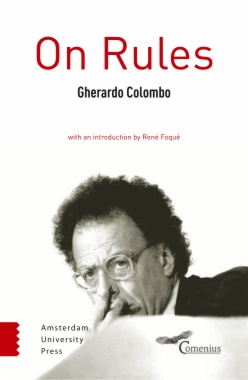Justice is simultaneously a practical and an ideal concept: when we think of justice, we refer to its day-to-day administration, involving police, lawyers, judges, and politicians—but we also refer to a larger ideal, a set of basic values that guide our attempts to live together and balance competing interests, obligations, and freedoms. If we lose sight of the practical, the ideal will fail—but if we forget the ideal, the practical becomes pointless.
On Rules is the culmination of decades of thinking about and working within the law as both an ideal and a realm of practical action. Gherardo Colombo brings to his rich philosophical analysis of the culture of justice thirty years of experience in the Italian judiciary, which saw him head up numerous important and sensitive commissions and inquiries. His exploration of the concept and application of rules of justice is powerful and clear: if we don’t root our experience in a fundamental respect for rules, we cannot have a functioning, just society.
- Cover
- Contents
- Introduction
- 1. An Imaginary Country
- Part I – The Ambiguities of Justice
- 2. Law and Justice
- 3. Laws Differing in Time and Space
- 4. ‘Justice’ is an Ambiguous Word
- 5. Law Comes From God
- 6. Law is Just If It is ‘Natural’
- 7. Law is Just When It Exists
- 8. From Subject to Citizen
- Part II – Horizontal Society and Vertical Society
- 9. The Vertical Society
- 10. The Horizontal Society
- 11. Structure of the Two Models
- 12. Consequences of the Vertical Society
- 13. Consequences of the Horizontal Society
- 14. Fundamental Rights According to the Two Models
- 15. Sanctions According to the Vertical Model
- 16. The Consequences to Offences in the Horizontal Society
- 17. Victim and Offender
- 18. Limits to Personal Liberty
- 19. Vertical Society, Horizontal Society, Ideology and Religion
- Part III – Towards a Horizontal Society
- 20. An Attempt to Justify Law at the End of the Second Millennium
- 21. The Limits of International Rules
- 22. An Attempt at Creating a Horizontal Society: the Italian Constitution
- 23. The Person Comes First
- 24. What is Missing?
- 25. Uncertainties in the Constitutional Process
- 26. Culture
- 27. The Interests of Those Who Oppose the Horizontal Society
- 28. Security
- 29. Escaping Responsibility
- Part IV – How Do We Get There?
- 30. The Time Dynamic
- 31. Self-Awareness
- Conclusion
- Acknowledgments

